- Joined
- Dec 10, 2014
- Messages
- 179
- Reaction score
- 385
You're looking for absolutes. You want to hear something like: "There are absolutely no redeeming factors to the Caribbean medical schools, and if you dare to attend one you are guaranteed to be royally screwed in every way."I haven't been given a source that says most of the spots are preliminary spots.
If I get that, don't worry, I'll be out of your life for good.
Unfortunately, life rarely presents us with absolutes.
Previous posters have shown that there's a high rate of attrition from the Caribbean schools. They've pointed out that even among those students that manage to graduate, the match rate is unacceptably low. Of those few who are lucky enough to actually match, many will end up in dead-end preliminary spots. And we know the situation is only going to get worse for them with the increased numbers of seats in US med schools and other factors. Does all of that mean that NONE of the Caribbean graduates will match? That NONE will match into their first choice, or into a competitive specialty? Of course not.
But the odds are not in their favor.
This is what you need to take away from what's been said here: Going to a Caribbean medical school is a BIG risk and a statistically unsound decision. If you feel comfortable taking that risk ... good luck, we wish you the best. And I mean that. I hope you succeed. Just go in with your eyes open, knowing that the deck is stacked against you, and the odds are high that you aren't going to like the outcome.

